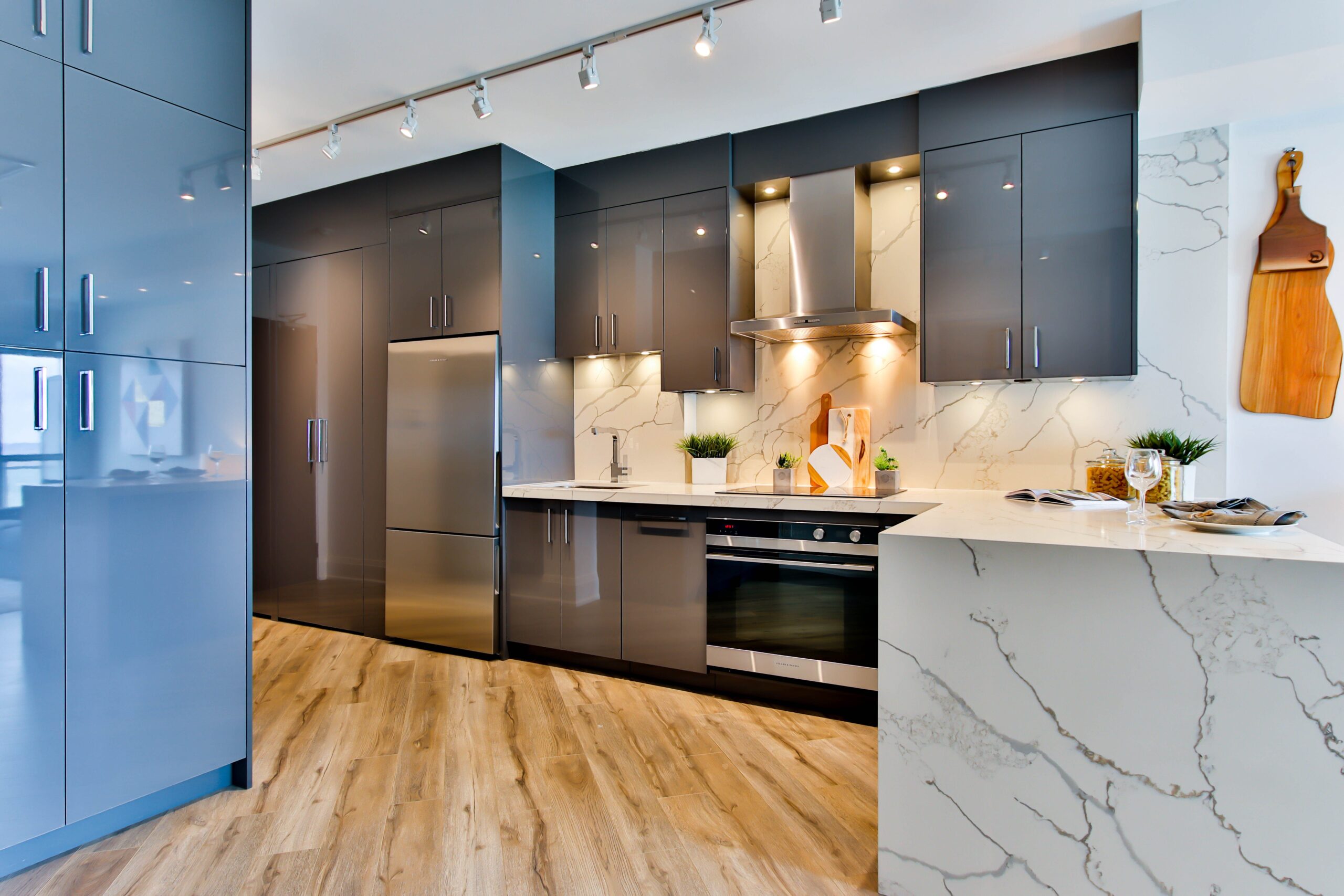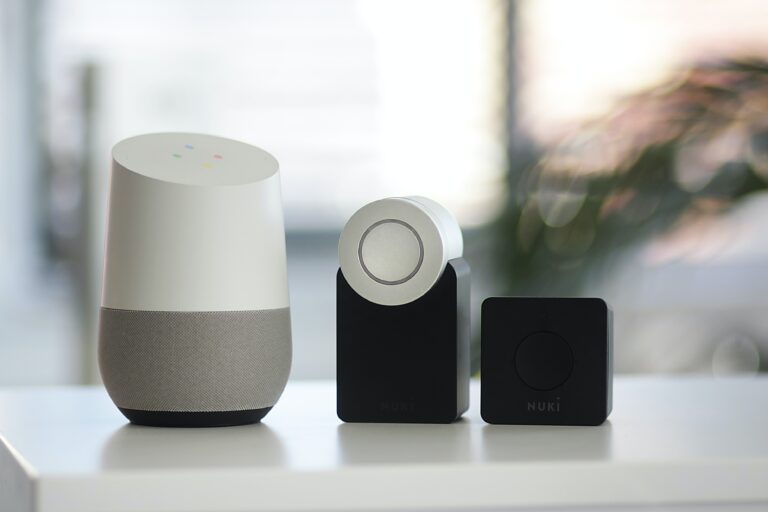Imagine your kitchen intuitively knowing your cooking preferences, optimizing energy consumption, and guiding you through recipes effortlessly. Smart kitchen appliances are not just about convenience; they’re about enhancing your lifestyle and creating a seamless cooking experience.
In this comprehensive guide, we’ll delve deep into the realm of smart kitchen appliances. From understanding their evolution to exploring various types and their functioning, we’ll leave no stone unturned.
Evolution of Kitchen Appliances

The story of smart kitchen appliances starts with a look back at the evolution of kitchen technology. From the wood-burning stoves of the past to the sleek induction cooktops of today, the kitchen has witnessed a remarkable transformation.
In the early 20th century, electric appliances like refrigerators, stoves, and toasters began making their way into homes, reducing manual labor and improving food preservation. Fast forward to the 21st century, and we find ourselves surrounded by smart appliances that are not just electric but also connected to the internet.
The shift from traditional to smart appliances has been marked by significant advancements in technology. Gone are the days of manually adjusting oven temperatures or worrying about the freshness of your groceries. Smart appliances bring automation and connectivity to the forefront, offering unparalleled convenience.
Today, you can control your oven’s temperature with a smartphone app, monitor your fridge’s contents remotely, and even have your coffee ready when you wake up. The journey from traditional to smart appliances has not only saved time but also elevated the cooking experience to new heights.
Types of Smart Kitchen Appliances
1. Smart Refrigerators
Smart refrigerators are the cornerstone of a modern kitchen. They come equipped with a plethora of features that go beyond just cooling your food.
Smart refrigerators can inventory your groceries, suggest recipes based on available ingredients, and even send you expiration date alerts. This not only reduces food wastage but also simplifies meal planning.
Brands like Samsung and LG have been at the forefront of smart refrigerator technology. Models like the Samsung Family Hub and LG InstaView are setting new standards.
Smart refrigerators are designed with energy efficiency in mind. They optimize cooling cycles and can adjust temperature settings to conserve energy.
2. Smart Ovens and Stoves
Cooking has never been easier than with smart ovens and stoves. These appliances take precision cooking to a whole new level.
Smart ovens offer features like remote temperature control, recipe-guided cooking, and even remote monitoring through your smartphone. This ensures that your dishes are perfectly cooked every time.
The June Oven and the Bosch Smart Wall Oven are excellent examples of smart ovens that have gained popularity.
Many smart ovens and stoves can seamlessly integrate with your smart home ecosystem, allowing you to control them through voice commands or a central hub.
3. Smart Coffee Makers
For coffee aficionados, smart coffee makers are a dream come true. These devices ensure that your morning brew is always just the way you like it.
Smart coffee makers can be programmed to start brewing at a specific time, adjust the strength of your coffee, and even order more beans when you’re running low.
Brands like Keurig and Nespresso offer smart coffee makers with Wi-Fi connectivity and app control.
Smart coffee makers let you customize your coffee to your heart’s content, ensuring that each cup is a delightful experience.
4. Smart Blenders and Food Processors
Preparing smoothies, soups, and sauces has never been easier than with smart blenders and food processors.
These appliances often come with pre-programmed settings for various recipes, ensuring consistent results. They can also be controlled remotely, allowing you to start blending or processing from anywhere in your home.
Brands like Vitamix and Ninja offer smart blenders and food processors with advanced features. Some smart blenders and food processors have recipe databases that guide you through the preparation process, making cooking more accessible for everyone.
5. Smart Dishwashers
The chore of doing the dishes is made much simpler with smart dishwashers. Smart dishwashers can optimize water usage, adjust wash cycles based on the load, and even alert you when it’s time to refill detergent or rinse aid.
Brands like Bosch and KitchenAid have introduced smart dishwashers that offer superior cleaning performance and convenience. These appliances excel at conserving water and energy, making them environmentally friendly choices.
6. Smart Kitchen Scales and Thermometers
Precision is key in cooking, and smart kitchen scales and thermometers ensure that you get your recipes just right.
Smart scales can measure ingredients accurately and provide nutritional information. Smart thermometers offer real-time temperature monitoring, ensuring that your dishes are cooked to perfection.
Brands like OXO and ThermoWorks offer reliable smart scales and thermometers that are essential for precise cooking. Whether you’re baking, grilling, or sous-vide cooking, these devices are your best allies in the kitchen.
How Smart Kitchen Appliances Work

1. Internet of Things (IoT) and Connectivity
The backbone of smart kitchen appliances is the Internet of Things (IoT) and seamless connectivity.
- Wi-Fi and Bluetooth Technology: Most smart appliances connect to your home network via Wi-Fi or Bluetooth, allowing you to control them remotely using your smartphone or other devices.
- Mobile Apps and Control Interfaces: Manufacturers provide dedicated mobile apps that enable you to monitor and control your appliances. These apps often include features like recipe libraries and remote diagnostics.
2. Sensors and Automation
Sensors play a crucial role in the functionality of smart kitchen appliances.
- Role of Sensors: Sensors detect changes in temperature, humidity, weight, and more. For instance, a smart oven’s sensor can gauge the internal temperature of your dish and adjust cooking settings accordingly.
- Automation of Cooking Processes: Smart appliances use data from sensors to automate cooking processes, ensuring consistent results and minimizing the risk of overcooking or undercooking.
3. Machine Learning and AI
Artificial intelligence (AI) and machine learning algorithms are the brains behind smart appliances.
- Adaptive Features and Machine Learning Algorithms: Over time, these appliances learn your preferences and cooking habits. For example, a smart oven might suggest cooking times and temperatures based on your previous recipes.
- Personalization and User Behavior Analysis: AI-driven appliances can analyze your cooking patterns and provide personalized recommendations, such as suggesting recipes based on ingredients you have on hand.
Benefits of Using Smart Kitchen Appliances
1. Time-Saving and Convenience
One of the most significant advantages of smart kitchen appliances is the time they save.
- Meal Preparation: With remote control and automation, you can start cooking or brewing your morning coffee before you even step into the kitchen.
- Effortless Multitasking: Smart appliances can handle multiple tasks simultaneously, allowing you to focus on other aspects of your cooking.
3. Energy Efficiency and Cost Savings
Smart appliances are designed to be energy-efficient, which can translate into long-term cost savings.
- Optimized Energy Consumption: Appliances like smart refrigerators and dishwashers can optimize their energy usage, reducing your utility bills.
- Reduced Food Waste: With features like inventory tracking, you’ll waste less food and save money on groceries.
4. Improved Cooking and Food Quality
Smart appliances bring precision and consistency to your cooking.
- Perfectly Cooked Dishes: Whether you’re baking, roasting, or brewing coffee, smart appliances ensure that your dishes are cooked to perfection every time.
- Enhanced Flavor: Consistency in cooking temperatures and timings can significantly improve the flavor and texture of your dishes.
5. Health and Dietary Benefits
For health-conscious individuals, smart appliances offer several advantages.
- Nutritional Information: Smart scales and food processors can provide nutritional information for your recipes, helping you make healthier choices.
- Portion Control: With accurate measurements, you can better control portion sizes, which is essential for maintaining a balanced diet.
6. Integration with Smart Home Ecosystems
Smart kitchen appliances are part of a larger smart home ecosystem.
- Voice Commands: Many appliances can be controlled using voice commands through virtual assistants like Amazon Alexa or Google Assistant.
- Seamless Automation: You can create automation routines that sync your kitchen appliances with other smart devices in your home, enhancing overall convenience.
Challenges and Considerations

1. Cost and Affordability
The convenience of smart appliances often comes at a price.
- Initial Investment: Smart appliances can be more expensive than their traditional counterparts, which can be a barrier to adoption for some.
- Long-Term Savings: While they may cost more upfront, the energy efficiency and reduced food waste of smart appliances can lead to long-term savings.
2. Privacy and Security Concerns
Connecting appliances to the internet raises concerns about privacy and security.
- Data Privacy: Manufacturers may collect data about your appliance usage, which can raise privacy concerns. Read privacy policies and choose appliances with robust security features.
- Cybersecurity: Smart appliances can be vulnerable to hacking if not properly secured. Ensure your network and devices have strong security measures in place.
3. Compatibility Issues
Not all smart appliances are compatible with each other or with your existing smart home ecosystem.
- Ecosystem Lock-In: Some manufacturers design their appliances to work best with their own ecosystem, limiting your choices.
- Compatibility Research: Before purchasing, research compatibility with your existing devices or consider investing in a single brand’s ecosystem for seamless integration.
4. Learning Curve and Technical Support
Using smart appliances effectively may require a learning curve.
- Setup and Configuration: Setting up and configuring smart appliances and their accompanying apps can be challenging for some users.
- Technical Support: Ensure the manufacturer offers adequate customer support and troubleshooting resources.
5. Environmental Impact
The production and disposal of electronics have environmental consequences.
- Electronic Waste: Discarded appliances contribute to electronic waste. Consider recycling options when disposing of old appliances.
- Energy Consumption: While smart appliances can be energy-efficient, their continuous connectivity can lead to increased energy consumption. Use energy-saving settings when possible.
Future Trends in Smart Kitchen Appliances
1. Integration with Voice Assistants
The integration of smart kitchen appliances with voice assistants is set to become even more seamless.
- Voice-Controlled Cooking: Imagine telling your oven to preheat to a specific temperature or asking your refrigerator for recipe suggestions, all with voice commands.
- Streamlined Interactions: Voice assistants like Amazon Alexa and Google Assistant will play a more prominent role in the kitchen, making cooking even more effortless.
2. Sustainability and Eco-Friendly Features
The future of smart kitchen appliances will prioritize sustainability.
- Energy Efficiency: Manufacturers will continue to improve energy efficiency, reducing the environmental impact of these appliances.
- Recyclability: Design considerations will focus on making appliances easier to recycle at the end of their lifecycle.
3. Enhanced AI and Machine Learning Capabilities
Smart appliances will become even smarter with advanced AI and machine learning.
- Predictive Cooking: AI algorithms will become more adept at predicting your cooking needs and suggesting recipes based on your dietary preferences.
- Energy Optimization: Appliances will intelligently adjust their energy usage based on usage patterns, further reducing environmental impact.
4. Modular and Customizable Kitchen Setups
The kitchen of the future will be highly modular and customizable.
- Adaptable Spaces: Your kitchen will adapt to your specific needs, with appliances and storage that can be rearranged and customized on the fly.
- Sustainable Materials: Eco-friendly materials and designs will take center stage in kitchen renovations.
Consumer Adoption and Market Trends in Smart Appliances

1. Current Adoption Rates
Smart kitchen appliances are on the rise, with increasing numbers of consumers embracing the convenience they offer.
- Growing Popularity: The adoption of smart appliances continues to grow steadily, driven by their demonstrated benefits.
- Early Adopters: Tech-savvy consumers were the first to adopt smart kitchen appliances, but they are becoming more mainstream.
2. Market Growth and Projections
The market for smart kitchen appliances is expected to expand in the coming years.
- Market Size: The global smart kitchen appliance market is projected to reach a significant market size, with robust growth expected.
- Innovation: Manufacturers are investing heavily in research and development to bring innovative features to market.
3. Consumer Preferences and Demographics
Understanding consumer preferences is key for manufacturers and consumers alike.
- Age and Tech Savviness: Younger generations are more likely to embrace smart kitchen appliances, but older generations are also showing interest as the technology matures.
- Lifestyle and Cooking Habits: Consumer preferences vary based on lifestyle and cooking habits, with some valuing convenience while others prioritize sustainability.
Conclusion
As we’ve explored the various types, benefits, working principles, and considerations of smart kitchen appliances, it’s clear that these devices are not just gadgets; they are game-changers. They save time, reduce energy consumption, enhance cooking quality, and offer a glimpse into the kitchen of the future.
While there are challenges, such as cost and privacy concerns, the benefits far outweigh the drawbacks for many consumers. With ongoing advancements and a focus on sustainability, the smart kitchen appliance industry is poised for even greater growth and innovation in the years to come.
So, whether you’re an early adopter or just curious about what the future holds for your kitchen, exploring the world of smart kitchen appliances is a journey worth taking. Welcome to the future of cooking!
Frequently Asked Questions
1. What is a smart kitchen appliance?
A smart kitchen appliance is a device equipped with advanced technology, including internet connectivity, sensors, and artificial intelligence, to enhance cooking and meal preparation. These appliances can be controlled remotely, offer automation features, and often integrate with other smart home devices.
2. What is the importance of smart appliances?
Smart appliances bring convenience, efficiency, and precision to the kitchen. They save time, reduce energy consumption, improve cooking quality, and offer features like remote control and automation, making cooking and meal preparation more accessible and enjoyable.
3. What is the demand for smart kitchen appliances?
The demand for smart kitchen appliances is steadily increasing. As consumers seek ways to simplify their daily routines and adopt more sustainable practices, the convenience and energy-saving features of smart appliances make them highly desirable.
4. What are the objectives of a smart kitchen?
The objectives of a smart kitchen include enhancing cooking convenience, reducing energy consumption, minimizing food waste, and improving overall cooking quality. Smart kitchens aim to streamline meal preparation while providing personalized cooking experiences.
5. What are the objectives of a modern kitchen?
In a modern kitchen, the objectives include efficient space utilization, the integration of advanced appliances, and the use of sustainable materials. Modern kitchens prioritize functionality, aesthetics, and ease of use to create comfortable cooking spaces.
6. What is the main objective of kitchen planning?
The main objective of kitchen planning is to create a functional and efficient space for meal preparation and cooking. Kitchen planners consider layout, appliance placement, storage solutions, and user convenience to design a space that meets the needs of the homeowner.



